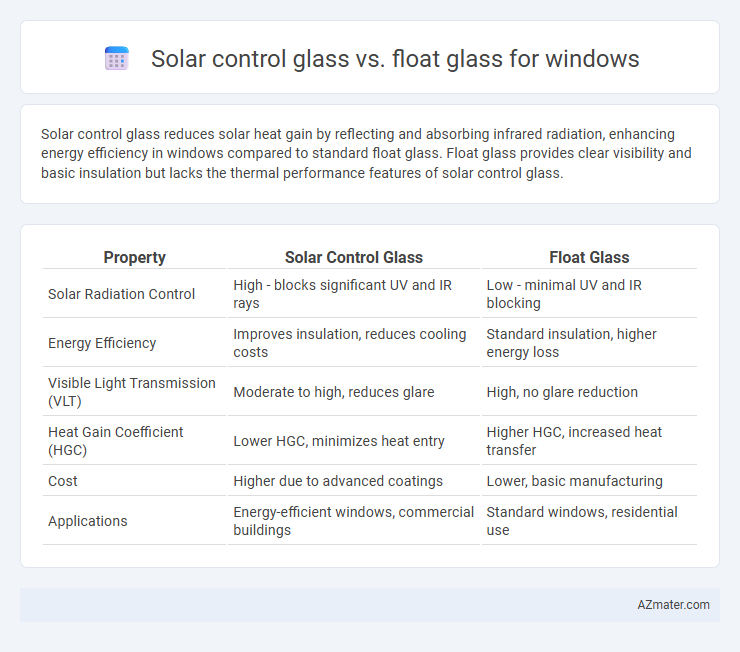Solar control glass reduces solar heat gain by reflecting and absorbing infrared radiation, enhancing energy efficiency in windows compared to standard float glass. Float glass provides clear visibility and basic insulation but lacks the thermal performance features of solar control glass.
Table of Comparison
| Property | Solar Control Glass | Float Glass |
|---|---|---|
| Solar Radiation Control | High - blocks significant UV and IR rays | Low - minimal UV and IR blocking |
| Energy Efficiency | Improves insulation, reduces cooling costs | Standard insulation, higher energy loss |
| Visible Light Transmission (VLT) | Moderate to high, reduces glare | High, no glare reduction |
| Heat Gain Coefficient (HGC) | Lower HGC, minimizes heat entry | Higher HGC, increased heat transfer |
| Cost | Higher due to advanced coatings | Lower, basic manufacturing |
| Applications | Energy-efficient windows, commercial buildings | Standard windows, residential use |
Overview of Solar Control Glass and Float Glass
Solar control glass is designed with special coatings or tints that reduce heat gain by reflecting and absorbing solar radiation, improving energy efficiency and indoor comfort in buildings. Float glass, produced by floating molten glass on a bed of molten metal, offers a smooth, uniform surface ideal for standard windows but lacks inherent solar heat rejection properties. Solar control glass enhances thermal insulation and reduces glare compared to float glass, making it preferable for energy-conscious architectural applications.
Key Differences Between Solar Control Glass and Float Glass
Solar control glass features a special coating that reflects infrared and UV rays, reducing heat gain and enhancing energy efficiency, while float glass is standard, clear, and lacks heat-reflective properties. Solar control glass often has a slightly tinted appearance to block solar radiation, whereas float glass is transparent and used primarily for general glazing. The thermal performance of solar control glass improves indoor comfort and reduces cooling costs, in contrast to float glass, which does not contribute to temperature regulation.
How Solar Control Glass Works
Solar control glass uses a special coating that reflects and absorbs a significant portion of solar radiation, reducing heat gain inside buildings and enhancing energy efficiency. This coating selectively filters infrared and ultraviolet rays while allowing visible light to pass through, maintaining natural daylight without excessive glare. Float glass, by contrast, lacks these properties and transmits most solar energy, leading to higher indoor temperatures and increased reliance on air conditioning.
Energy Efficiency: Solar Control vs. Float Glass
Solar control glass significantly enhances energy efficiency by reflecting and absorbing a substantial portion of solar heat, reducing cooling loads and optimizing indoor temperature regulation. Float glass, while cost-effective and widely used, lacks specialized coatings to mitigate solar heat gain, leading to higher energy consumption for air conditioning. Choosing solar control glass over float glass can result in notable energy savings and improved thermal comfort in buildings.
Light Transmission and Visual Comfort
Solar control glass significantly reduces light transmission by filtering harmful UV rays and controlling solar heat gain, enhancing visual comfort by minimizing glare and preventing interior overheating. Float glass, with higher light transmission rates, allows more natural light but offers limited protection against solar heat and glare, often resulting in increased indoor temperatures and visual discomfort. Choosing solar control glass improves energy efficiency and occupant comfort by balancing daylight access with effective solar heat management.
Heat Blocking Capabilities
Solar control glass significantly reduces solar heat gain by reflecting and absorbing infrared radiation, making it highly effective in lowering indoor temperatures and improving energy efficiency. Float glass, lacking specialized coatings, allows more heat to pass through, leading to higher cooling demands in buildings. Choosing solar control glass over float glass enhances thermal comfort and reduces reliance on air conditioning systems.
Applications in Modern Architecture
Solar control glass enhances energy efficiency in modern architecture by reducing heat gain while allowing natural light, making it ideal for commercial buildings and high-rise structures seeking sustainable design. Float glass, known for its clarity and cost-effectiveness, is widely used in residential windows and standard glazing applications where minimal energy control is required. Modern architectural projects prioritize solar control glass for facade systems to meet stringent environmental standards and improve occupant comfort.
Cost Comparison and Long-term Savings
Solar control glass typically costs 20-40% more than standard float glass due to its advanced coatings that reduce heat gain and UV radiation. Despite higher initial expenses, solar control glass lowers energy bills by improving thermal efficiency and reducing air conditioning usage over time. Long-term savings from decreased cooling costs and enhanced comfort often outweigh the upfront price difference compared to float glass.
Durability and Maintenance Concerns
Solar control glass offers superior durability compared to float glass due to its special coatings that resist UV radiation, reducing degradation over time. It requires minimal maintenance since the coatings help prevent dirt accumulation and reduce the need for frequent cleaning. Float glass, while more affordable, is prone to surface scratches and discoloration, leading to higher maintenance efforts and shorter lifespan in exterior window applications.
Choosing the Right Glass for Your Windows
Solar control glass significantly reduces heat gain by reflecting and absorbing solar radiation, enhancing energy efficiency and comfort in buildings. Float glass offers a cost-effective, clear option with good strength but lacks the specialized coating that improves thermal performance. Choosing the right glass involves balancing budget, climate, and energy-saving goals, with solar control glass providing superior temperature regulation and UV protection for modern window installations.

Infographic: Solar control glass vs Float glass for Window
 azmater.com
azmater.com